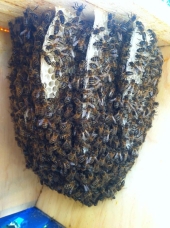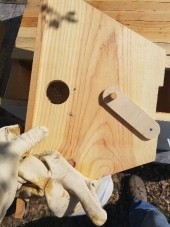
















Why do you feel safe when mankind has only proven to be able to survive 12,000 years at a stretch...? Be prepared for the next probable end: http://www.teomcrote.co.nf
Security: Rhodesian Ridgeback; Animals: Scobies and rabbits; Diet: Born to Run; Religion: trust no one; my best posts/replies so far
 2
2




Moderator, Treatment Free Beekeepers group on Facebook.
https://www.facebook.com/groups/treatmentfreebeekeepers/





 1
1








Why do you feel safe when mankind has only proven to be able to survive 12,000 years at a stretch...? Be prepared for the next probable end: http://www.teomcrote.co.nf
Security: Rhodesian Ridgeback; Animals: Scobies and rabbits; Diet: Born to Run; Religion: trust no one; my best posts/replies so far




Socrates Raramuri wrote:
What i'd like to see from my hives is:
- honey
- kind for the bees
- if at all possible, without having to use those suits (i.e. easy-going bees or me knowing how to keep them easy-going)
- i am not interested in a lot of work
Having researched the value of hive products, i'm not only interested in making mead [which i've been doing for some time now], but i'd like to try the old-fashioned way of just throwing in whole chunks of hive and letting it ferment. So i need my own hives for that, for good quality honey, and for affordable honey. I do have a lot more on my plate and am not looking for a career as beekeeper.
Moderator, Treatment Free Beekeepers group on Facebook.
https://www.facebook.com/groups/treatmentfreebeekeepers/









Why do you feel safe when mankind has only proven to be able to survive 12,000 years at a stretch...? Be prepared for the next probable end: http://www.teomcrote.co.nf
Security: Rhodesian Ridgeback; Animals: Scobies and rabbits; Diet: Born to Run; Religion: trust no one; my best posts/replies so far




Moderator, Treatment Free Beekeepers group on Facebook.
https://www.facebook.com/groups/treatmentfreebeekeepers/









find religion! church
kiva! hyvä! iloinen! pikkumaatila
get stung! beehives
be hospitable! host-a-hive
be antisocial! facespace




tel jetson wrote:aggressive bees sometimes have an advantage over more docile colonies, particularly if predation is a serious issue. a "hot" hive is only a problem for the beekeeper if she or he wants to get into the hive frequently.
I currently have one fairly disagreeable colony. I don't sit next to that one to watch entrance behavior quite as frequently as I do others. no need to squash any queens, et cetera, though. I think this gets back to Ernie's point above: it depends what the beekeeper's after.
Moderator, Treatment Free Beekeepers group on Facebook.
https://www.facebook.com/groups/treatmentfreebeekeepers/










Michael Cox wrote:
Actually there are quite a few reasons why hot hives are not great to keep around, not just for the purposes of inspection:
If you need to work in the area - cutting grass, tending other plants etc... aggressive bees from a hot hive can get easily riled.
Michael Cox wrote:If the hives are in any way "public" - mine are in a garden on school property. Most hives I would happily open without a suit, one hive has bees that will attack unprovoked within about 20m of the hive. If the public can get access to the area via a passing footpath (even on the other side of the hedge etc...) then I suggest you have an obligation to requeen them.
Michael Cox wrote:Education - I use my hives for teaching and take novices to them. I need nice docile bees so they don't get freaked out.
find religion! church
kiva! hyvä! iloinen! pikkumaatila
get stung! beehives
be hospitable! host-a-hive
be antisocial! facespace

|
I thought it was a bear, but it's just a tiny ad
Looking for cold-climate growers to join a GOOF livestream panel (Missoula)
https://permies.com/t/369111/cold-climate-growers-join-GOOF
|



